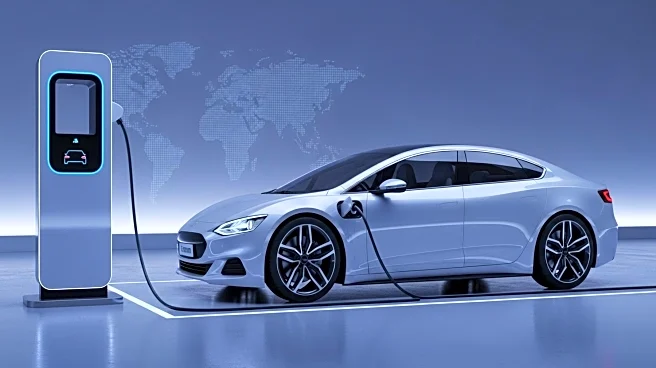What's Happening?
The European Union's stringent CO2 emissions targets are significantly influencing the automotive industry, leading to a surge in electric vehicle (EV) sales across Europe. According to a report by Transport & Environment (T&E), European manufacturers have seen a nearly 40% increase in EV sales in the first half of 2025. Volkswagen, Europe's largest automaker, reported an 89% increase in EV sales, attributed to the pressure of meeting EU emissions targets. Despite this growth, there is ongoing pressure from carmakers to weaken the 2030 and 2035 emissions targets. Mercedes-Benz, a major opponent of these targets, is currently the only European manufacturer not on track to meet the 2025-2027 targets without purchasing credits. The EU has already extended the 2025 target deadline by two years, but further concessions could hinder the industry's progress in electrification.
Why It's Important?
The EU's emissions targets are crucial for maintaining the competitiveness of European carmakers in the global EV market. As countries worldwide, including China and emerging markets like Indonesia and Thailand, increase their EV sales, European manufacturers must adapt to remain relevant. Weakening emissions targets could result in Europe falling behind in the global race for electrification, potentially turning the region into a 'car museum' rather than a leader in automotive innovation. The current market conditions, including falling battery costs and expanded charging infrastructure, support the growth of affordable EVs, making it imperative for the EU to maintain its emissions standards to ensure long-term industry success.
What's Next?
The EU faces a critical decision on whether to maintain or adjust its emissions targets. If the targets are upheld, European manufacturers will need to continue investing in EV technology and infrastructure to meet compliance. This could lead to increased competition and innovation within the industry. Conversely, if the targets are weakened, it may slow the transition to electric vehicles, affecting the EU's position in the global market. Stakeholders, including environmental groups and industry leaders, are likely to continue lobbying for their respective interests as the EU deliberates on its emissions policies.
Beyond the Headlines
The push for electrification in Europe highlights broader ethical and environmental considerations. Maintaining strict emissions targets aligns with global efforts to combat climate change and reduce carbon footprints. Additionally, the transition to EVs presents opportunities for job creation in new sectors, such as battery manufacturing and charging infrastructure development. However, it also poses challenges for traditional automotive jobs, necessitating workforce retraining and adaptation.








